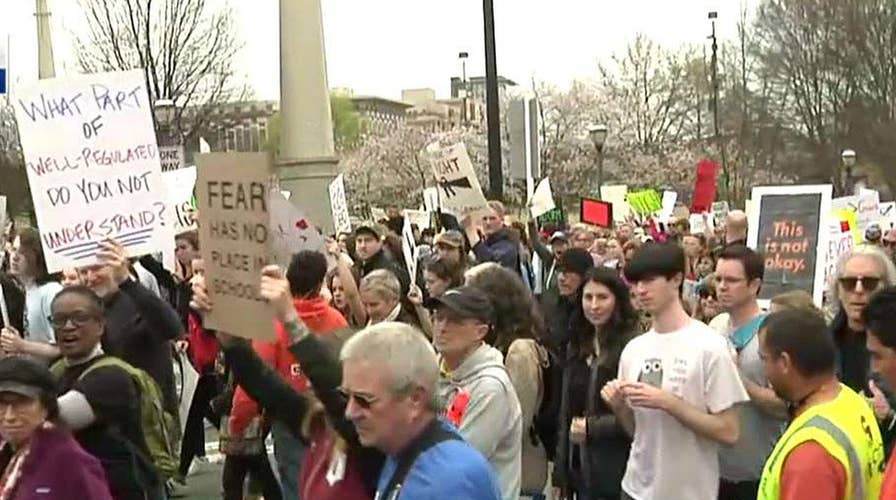Thousands participate in Atlanta's March for Our Lives
Students speak out about why the decided to join the demonstrations.
As hundreds of thousands of people demonstrated against gun violence Saturday in Washington and other American cities, there were other signs as well across the nation of new worries about our safety.
Kids are wearing clear backpacks to school. This is not a fashion trend or the latest must-have item, but rather a safety requirement following the recent school shooting in Florida that claimed 17 lives. All this is heartbreaking and, as a parent, a challenge to navigate.
What do we say when our kids ask why? What do we say to the littlest ones – who are excited to paint, learn to read and try their hands at addition and subtraction – but who are also scared of something they can’t possibly understand?
What do we say to the high school student who is eager to round out his or her college application by participating in afterschool activities, but is too scared to stay at school for any length of time beyond the required hours?
Middle schoolers face the most awkward years of their lives and now – in addition to trying to figure out who they are and how to navigate those uncomfortable years – they are also faced with the fear that saying or doing the wrong thing could land them on someone’s literal hit list.
It is no wonder anxiety in children is at an all-time high. I would venture to guess the numbers will continue to rise.
I have four kids and I lead an organization devoted to strengthening marriages and families, but when children are being shot in their schools, fear can easily take root, even for me.
So, what can parents do? I believe it starts in the earliest years. Even with our toddlers we can be committed to authenticity. We can allow our own emotions to show and we can model real life to our kids.
As they watch us navigate the toughest realities of life, our children will gain the confidence to do it too. We can acknowledge their feelings and help them understand and name what they are experiencing.
As followers of Jesus, my wife and I teach our kids about a loving God who cares about their pain and desires to know and offer full acceptance of them in Christ. We do this by walking out our own faith in their view. As they hear the earnest prayers of our hearts, they understand what it means to live and experience the ups and downs of life.
If we build a foundation of support and understanding at home when things are going well then, when the tough stuff comes – as it undoubtedly will – our children will recognize that not only are their parents in their corner, but the God of the universe is as well, and they will know how to lean on the faith they’ve seen modeled.
Fear is an unavoidable part of the human experience, but so too are joy, compassion, frustration, anger, happiness, excitement, sadness and more. Fear is just one way to feel out of a whole host of feelings, but Christians can approach fear with a different sort of confidence.
What I hope and pray for my kids is that they will have the ability to recognize what they are experiencing so we can work together to find a way through. Even though there are legitimate things to fear, we must not allow fear to control us.
If the fear of a potential attack takes away our willingness to live, then evil has already won. The horror is real. The devastation and shocking potential for human depravity are real. But we cannot allow these possibilities to steal our opportunity for a rich and joyful life.
The younger generation must learn, as each generation before has learned, to continue to live despite the potential for harm.
Because our faith is such an integral part of our life as a family, I often wonder how a parent possibly walks through the challenges of life without a strong faith tradition. If our only hope comes from the expectation of positive news headlines, we will surely grow faint and give in to the temptation to give up.
I simply cannot imagine facing life with nothing but my own strength.
At FamilyLife, the organization I head that provides biblically based help for people at every stage of marriage and family life, we are committed to helping parents replace fear and uncertainty with hope, and equipping them to guide their children with confidence, even in the most tumultuous times.
There are no easy answers to the hard questions facing our society and our children today. But, when I am unsure of what to do, I start by studying Scripture and leaning into the wisdom of the generations. I hope to teach my children to do the same – even when the world requires clear backpacks.

